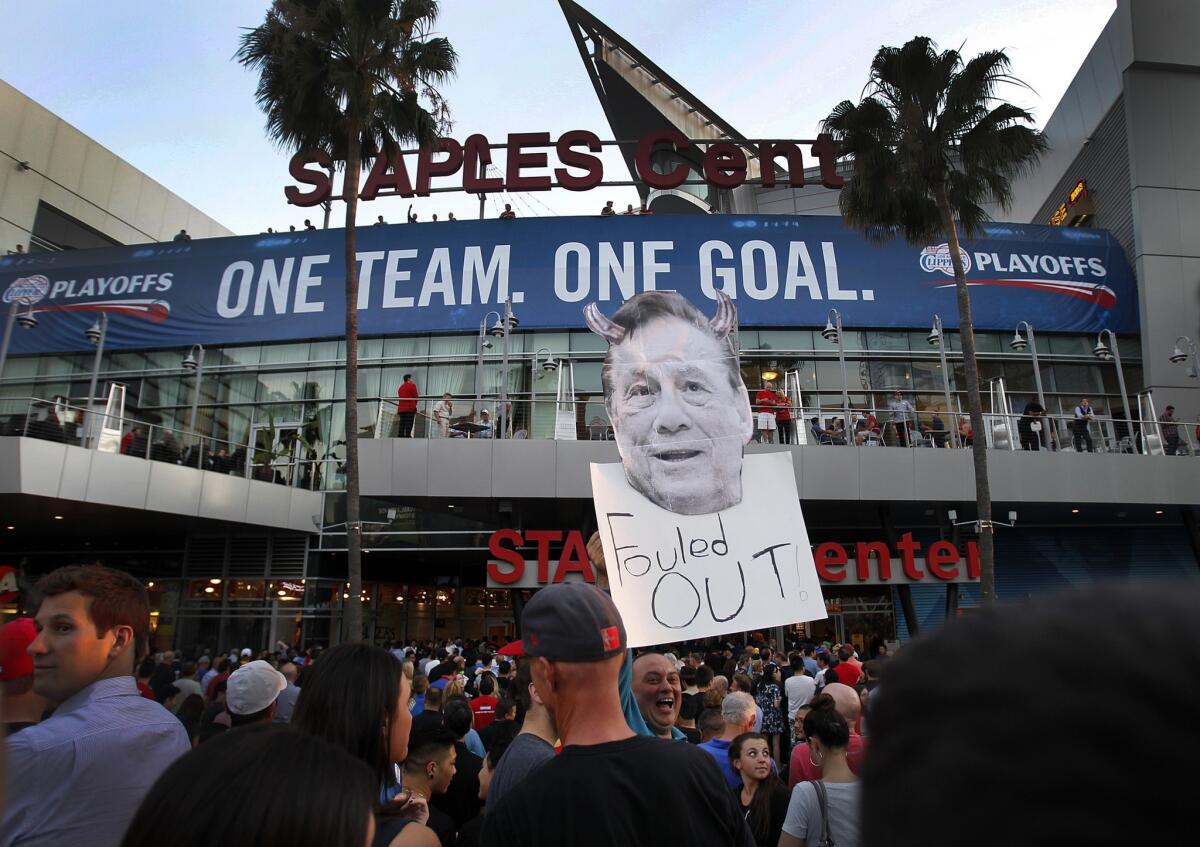Opinion: The NBA won’t tolerate racism, so why does the NFL tolerate ‘Redskins’?

- Share via
Now that the NBA is addressing ownership problems that fester behind closed doors, will the NFL step up to deal with a problem in plain sight?
After NBA Commissioner Adam Silver determined that Clippers owner Donald Sterling was the voice on the audio recording telling friend V. Stiviano not to associate with black people, the NBA punished him with a lifetime ban and a $2.5 million fine. The decision came after decades of wretched behavior. And the controversy is likely to drag on throughout the playoffs as the league wields unprecedented power to sanction Sterling and force the sale of the team.
If the NBA is finally willing to take a stand against owners spewing racist bile in private conversations, how can the NFL continue to defend Daniel Snyder, the owner of the Washington Redskins, which continues to use a name and logo widely seen as disrespectful to Native Americans? Oh yeah, money. Washington’s team was ranked third on Forbes’ list of the most valuable NFL franchises in 2013 with an estimated worth of $1.7 billion.
Granted, Sterling and Snyder are not a perfect bigot-to-bigot comparison. Sterling’s 19th century plantation worldview is especially stomach-churning given that African Americans represent the majority of the NBA’s players, stars and legends — and a vital fan base. Snyder, on the other hand, is free to profit from racial exploitation of a people who remain among the most marginalized in our society. (One problem is the lack of Native American representation in the NFL. According to 2013 data, Native American representation among league management is well below 1%, with similarly low numbers among players, coaches and management across the league.)
The Sterling debacle should give NFL Commissioner Roger Goodell inspiration to emulate Silver. While the term “redskin” is relatively innocuous in its historical context, time has rendered it a relic that reinforces offensive Wild West stereotypes. A white billionaire’s determination to exploit those stereotypes reduces years of genocide against Native Americans to a crude exercise in branding. The name has incited debate for more than 20 years, but the NBA’s action against Sterling opens the door for Goodell to leverage his power and demonstrate that no single franchise, no matter how profitable, trumps the values of the entire league.
If that were the happen, the Sterling circus could usher in a better era in American pro sports, pressuring other franchises to follow suit by retiring names and mascots like the Cleveland Indians’ “Chief Wahoo,” a gross caricature that has been protested for years.
Oneida Indian Nation Representative Ray Halbritter wants to seize the moment. He released this statement linking Sterling to Snyder: “In taking such appropriate disciplinary action, the NBA has shown leagues like the NFL that they have a moral responsibility to take disciplinary action against people like Dan Snyder, who also continues to proudly promote bigotry with the use of a dictionary-defined racial slur as his team’s name.”
In its decision to punish Sterling, the NBA is protecting its bottom line, sure, but it’s also making up for lost time. The NFL might not have as much money at stake — at least until sponsors wake up to reality — but Goodell needs to do the same by forcing Snyder to join the rest of us in the 21st century.
ALSO:
Toyota trades in SoCal for ‘macho’ Texas: That just ain’t right
Why celebrate ‘The Grapes of Wrath’? It’s bad fiction and bad history.
Chris Feliciano Arnold is a recipient of a 2014 Literature Fellowship from the National Endowment of the Arts. He has written essays and journalism for the Atlantic, Salon, the Millions, the Rumpus and Los Angeles Review of Books. Follow him on Twitter @chrisarnold.
More to Read
A cure for the common opinion
Get thought-provoking perspectives with our weekly newsletter.
You may occasionally receive promotional content from the Los Angeles Times.










